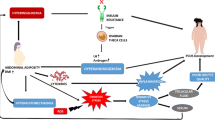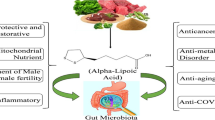Abstract
Background
Polycystic ovary syndrome (PCOS) is a common reproductive endocrine disorder, which is frequently accompanied by insulin resistance, oxidative stress (OS), and dyslipidemia. Astragalus polysaccharide (APS)—as a water-soluble heteropolysaccharide—can lower blood sugar and lipid and exert anti-aging effects and thus has been proven to be beneficial to various types of metabolic diseases. However, specific mechanisms of the action of APS on PCOS are yet to be studied.
Methods
Herein, BALB/C female mice aged 3 weeks were randomly divided into three groups (10 mice/group): oil + PBS group, DHEA + PBS group, and DHEA + APS group. Changes in the estrous cycle, ovarian tissue sections, serum levels of the hormone, blood glucose, blood lipid, and OS were studied. The intestinal microbiome was sequenced and Spearman correlation analysis was used to analyze the correlation between serum metabolic indexes and microflora.
Results
The results revealed that APS treatment ameliorated insulin resistance, OS, and dyslipidemia in PCOS mice. The results of 16S rDNA sequencing indicated that there were significant differences in the composition and diversity of intestinal microorganisms between DHEA and APS treatments. Firmicutes, Lachnospiraceae, Bacilli, Lactobacillaceae, and Lachnospiraceae_NK4A13_group were abundant in the oil + PBS group. Bacteroidota and Muribaculaceae were enriched in the DHEA + PBS group, while Rikenellaceae, Odoribacter, and Marinifilaceae were enriched in the DHEA + APS group. Furthermore, Spearman correlation analysis showed that there were close interactions and correlations between intestinal bacteria and indicators of blood glucose, blood lipids, steroid hormones, and OS in PCOS mice.
Conclusions
Overall, the study showed that APS improved PCOS in mice by correcting serum metabolic disorders and increasing microbiome diversity, which may provide insight into understanding the pathogenesis and be a beneficial intervention for PCOS.








Similar content being viewed by others
References
H.J. Teede, M.L. Misso, J.A. Boyle, R.M. Garad, V. McAllister, L. Downes et al. Translation and implementation of the Australian-led PCOS guideline: clinical summary and translation resources from the International Evidence-based Guideline for the Assessment and Management of Polycystic Ovary Syndrome. Med. J. Aust. 209(S7), S3–s8 (2018)
American College of Obstetricians and Gynecologists’ Committeeon Practice Bulletins—Gynecology. ACOG Practice Bulletin No. 194: Polycystic Ovary Syndrome. Obstet Gynecol. 131(6), e157–e171 (2018)
R. Azziz, E. Carmina, Z. Chen, A. Dunaif, J.S. Laven, R.S. Legro et al. Polycystic ovary syndrome. Nat. Rev. Dis. Prim. 2, 16057 (2016)
H.M. Sadeghi, I. Adeli, D. Calina, A.O. Docea, T. Mousavi, M. Daniali et al. Polycystic Ovary Syndrome: A Comprehensive Review of Pathogenesis, Management, and Drug Repurposing. Int. J. Mol. Sci. 23(2), 33 (2022)
L. Yang, Y. Chen, Y. Liu, Y. Xing, C. Miao, Y. Zhao et al. The Role of Oxidative Stress and Natural Antioxidants in Ovarian Aging. Front Pharm. 11, 617843 (2020)
S.A. Dabravolski, N.G. Nikiforov, A.H. Eid, L.V. Nedosugova, A.V. Starodubova, T.V. Popkova et al. Mitochondrial Dysfunction and Chronic Inflammation in Polycystic Ovary Syndrome. Int. J. Mol. Sci. 22(8), 20 (2021)
E. Rudnicka, K. Suchta, M. Grymowicz, A. Calik-Ksepka, K. Smolarczyk, A.M. Duszewska et al. Chronic Low Grade Inflammation in Pathogenesis of PCOS. Int. J. Mol. Sci. 22(7), 12 (2021)
S. Bisht, M. Faiq, M. Tolahunase, R. Dada, Oxidative stress and male infertility. Nat. Rev. Urol. 14(8), 470–485 (2017)
M. Murri, M. Luque-Ramírez, M. Insenser, M. Ojeda-Ojeda, H.F. Escobar-Morreale, Circulating markers of oxidative stress and polycystic ovary syndrome (PCOS): a systematic review and meta-analysis. Hum. Reprod. Update 19(3), 268–288 (2013)
R. Gharaei, F. Mahdavinezhad, E. Samadian, J. Asadi, Z. Ashrafnezhad, L. Kashani et al. Antioxidant supplementations ameliorate PCOS complications: a review of RCTs and insights into the underlying mechanisms. J. Assist Reprod. Genet. 38(11), 2817–2831 (2021)
H. Yaribeygi, T. Sathyapalan, S.L. Atkin, A. Sahebkar, Molecular Mechanisms Linking Oxidative Stress and Diabetes Mellitus. Oxid. Med. Cell Longev. 2020, 8609213 (2020)
E.A. Greenwood, H.G. Huddleston, Insulin resistance in polycystic ovary syndrome: concept versus cutoff. Fertil. Steril. 112(5), 827–828 (2019)
H.J. Teede, M.L. Misso, M.F. Costello, A. Dokras, J. Laven, L. Moran et al. Recommendations from the international evidence-based guideline for the assessment and management of polycystic ovary syndrome. Hum. Reprod. 33(9), 1602–1618 (2018)
L. Della Corte, V. Foreste, F. Barra, C. Gustavino, F. Alessandri, M.G. Centurioni et al. Current and experimental drug therapy for the treatment of polycystic ovarian syndrome. Expert Opin. Investig. Drugs 29(8), 819–830 (2020)
N. Brettenthaler, C. De Geyter, P.R. Huber, U. Keller, Effect of the insulin sensitizer pioglitazone on insulin resistance, hyperandrogenism, and ovulatory dysfunction in women with polycystic ovary syndrome. J. Clin. Endocrinol. Metab. 89(8), 3835–3840 (2004)
M. Rondanelli, A. Riva, G. Petrangolini, P. Allegrini, A. Giacosa, T. Fazia, et al. Berberine Phospholipid Is an Effective Insulin Sensitizer and Improves Metabolic and Hormonal Disorders in Women with Polycystic Ovary Syndrome: A One-Group Pretest-Post-Test Explanatory Study. Nutrients 13(10), 14 (2021)
Y. Zheng, W. Ren, L. Zhang, Y. Zhang, D. Liu, Y. Liu, A Review of the Pharmacological Action of Astragalus Polysaccharide. Front. Pharm. 11, 349 (2020)
M. Liu, J. Qin, Y. Hao, M. Liu, J. Luo, T. Luo et al. Astragalus polysaccharide suppresses skeletal muscle myostatin expression in diabetes: involvement of ROS-ERK and NF-κB pathways. Oxid. Med. Cell Longev. 2013, 782497 (2013)
X. Pu, W. Fan, S. Yu, Y. Li, X. Ma, L. Liu et al. Polysaccharides from Angelica and Astragalus exert hepatoprotective effects against carbon-tetrachloride-induced intoxication in mice. Can. J. Physiol. Pharm. 93(1), 39–43 (2015)
P. Giampaolino, V. Foreste, C. Di Filippo, A. Gallo, A. Mercorio, P. Serafino et al. Microbiome and PCOS: State-of-Art and Future Aspects. Int J. Mol. Sci. 22(4 Feb), 2048 (2021)
S. Chang, A. Dunaif, Diagnosis of Polycystic Ovary Syndrome: Which Criteria to Use and When? Endocrinol. Metab. Clin. North Am. 50(1), 11–23 (2021)
L. Corrie, M. Gulati, S.K. Singh, B. Kapoor, R. Khursheed, A. Awasthi et al. Recent updates on animal models for understanding the etiopathogenesis of polycystic ovarian syndrome. Life Sci. 280, 119753 (2021)
C.X. Li, Y. Liu, Y.Z. Zhang, J.C. Li, J. Lai, Astragalus polysaccharide: a review of its immunomodulatory effect. Arch. Pharm. Res. 45(6), 367–389 (2022)
S. Deng, L. Yang, K. Ma, W. Bian, Astragalus polysaccharide improve the proliferation and insulin secretion of mouse pancreatic β cells induced by high glucose and palmitic acid partially through promoting miR-136-5p and miR-149-5p expression. Bioengineered 12(2), 9872–9884 (2021)
H.C. Hu, W. Zhang, P.Y. Xiong, L. Song, B. Jia, X.L. Liu, Anti-inflammatory and antioxidant activity of astragalus polysaccharide in ulcerative colitis: A systematic review and meta-analysis of animal studies. Front. Pharm. 13, 1043236 (2022)
W. Sha, B. Zhao, H. Wei, Y. Yang, H. Yin, J. Gao et al. Astragalus polysaccharide ameliorates vascular endothelial dysfunction by stimulating macrophage M2 polarization via potentiating Nrf2/HO-1 signaling pathway. Phytomedicine 112, 154667 (2023)
B. Kalyne, B.D. Murphy. Reproductive tract changes during the mouse estrous cycle. The guide to investigation of mouse pregnancy. 7, 85–94 (2013)
X. Chen, C. Chen, X. Fu, Hypoglycemic activity in vitro and vivo of a water-soluble polysaccharide from Astragalus membranaceus. Food Funct. 13(21), 11210–11222 (2022)
X. Chen, C. Chen, X. Fu, Hypoglycemic effect of the polysaccharides from Astragalus membranaceus on type 2 diabetic mice based on the “gut microbiota-mucosal barrier”. Food Funct. 13(19), 10121–10133 (2022)
J. Zhang, Q. Feng, Pharmacological Effects and Molecular Protective Mechanisms of Astragalus Polysaccharides on Nonalcoholic Fatty Liver Disease. Front Pharm. 13, 854674 (2022)
M. Zhong, Y. Yan, H. Yuan, R. A, G. Xu, F. Cai et al. Astragalus mongholicus polysaccharides ameliorate hepatic lipid accumulation and inflammation as well as modulate gut microbiota in NAFLD rats. Food Funct. 13(13), 7287–7301 (2022)
C. Lu, H. Wang, J. Yang, X. Zhang, Y. Chen, R. Feng et al. Changes in Vaginal Microbiome Diversity in Women With Polycystic Ovary Syndrome. Front. Cell Infect. Microbiol 11, 755741 (2021)
Y.L. Yang, W.W. Zhou, S. Wu, W.L. Tang, Z.W. Wang, Z.Y. Zhou et al. Intestinal Flora is a Key Factor in Insulin Resistance and Contributes to the Development of Polycystic Ovary Syndrome. Endocrinology 162(10), bqab118 (2021)
M. Gyuraszova, A. Kovalcikova, R. Gardlik, Association between oxidative status and the composition of intestinal microbiota along the gastrointestinal tract. Med. Hypotheses 103, 81–85 (2017)
T. Li, T. Zhang, H. Gao, R. Liu, M. Gu, Y. Yang et al. Tempol ameliorates polycystic ovary syndrome through attenuating intestinal oxidative stress and modulating of gut microbiota composition-serum metabolites interaction. Redox. Biol. 41, 101886 (2021)
Y. Hong, B. Li, N. Zheng, G. Wu, J. Ma, X. Tao et al. Integrated Metagenomic and Metabolomic Analyses of the Effect of Astragalus Polysaccharides on Alleviating High-Fat Diet-Induced Metabolic Disorders. Front. Pharm. 11, 833 (2020)
T. Wang, L. Sha, Y. Li, L. Zhu, Z. Wang, K. Li et al. Dietary α-Linolenic Acid-Rich Flaxseed Oil Exerts Beneficial Effects on Polycystic Ovary Syndrome Through Sex Steroid Hormones-Microbiota-Inflammation Axis in Rats. Front. Endocrinol. (Lausanne) 11, 284 (2020)
Y.X. Wu, X.Y. Yang, B.S. Han, Y.Y. Hu, T. An, B.H. Lv et al. Naringenin regulates gut microbiota and SIRT1/ PGC-1ɑ signaling pathway in rats with letrozole-induced polycystic ovary syndrome. Biomed. Pharmacother. 153, 113286 (2022)
Funding
This work was supported by the National Natural Science Foundation of China (grant number 82260305), Development of Gansu Province(21YF5FA119), Lanzhou Science and Technology Bureau project (2021-148) and Hospital fund of the First Hospital of Lanzhou University(ldyyyn2019-62).
Author information
Authors and Affiliations
Contributions
Y.Y. developed the topic and served as the guarantor of this study. X.M. designed the search strategies. R.L. and R.H. conducted basic test and draft writing. Y.H. and D.L. was responsible for processing data. R.L., Y.H., and R.H. revised the first draft multiple times and reached consensus on the final draft. All authors contributed to the paper and approved the publication of the submitted version.
Corresponding author
Ethics declarations
Conflict of interest
The authors declare no competing interests.
Ethical approval
The study was approved by the First Hospital of Lanzhou University review board (LDYYLL-2019-17).
Additional information
Publisher’s note Springer Nature remains neutral with regard to jurisdictional claims in published maps and institutional affiliations.
Supplementary information
Rights and permissions
Springer Nature or its licensor (e.g. a society or other partner) holds exclusive rights to this article under a publishing agreement with the author(s) or other rightsholder(s); author self-archiving of the accepted manuscript version of this article is solely governed by the terms of such publishing agreement and applicable law.
About this article
Cite this article
Li, R., Hu, R., Huang, Y. et al. Astragalus polysaccharide alleviates polycystic ovary syndrome by reducing insulin resistance and oxidative stress and increasing the diversity of gut microbiota. Endocrine 83, 783–797 (2024). https://doi.org/10.1007/s12020-023-03553-x
Received:
Accepted:
Published:
Issue Date:
DOI: https://doi.org/10.1007/s12020-023-03553-x




